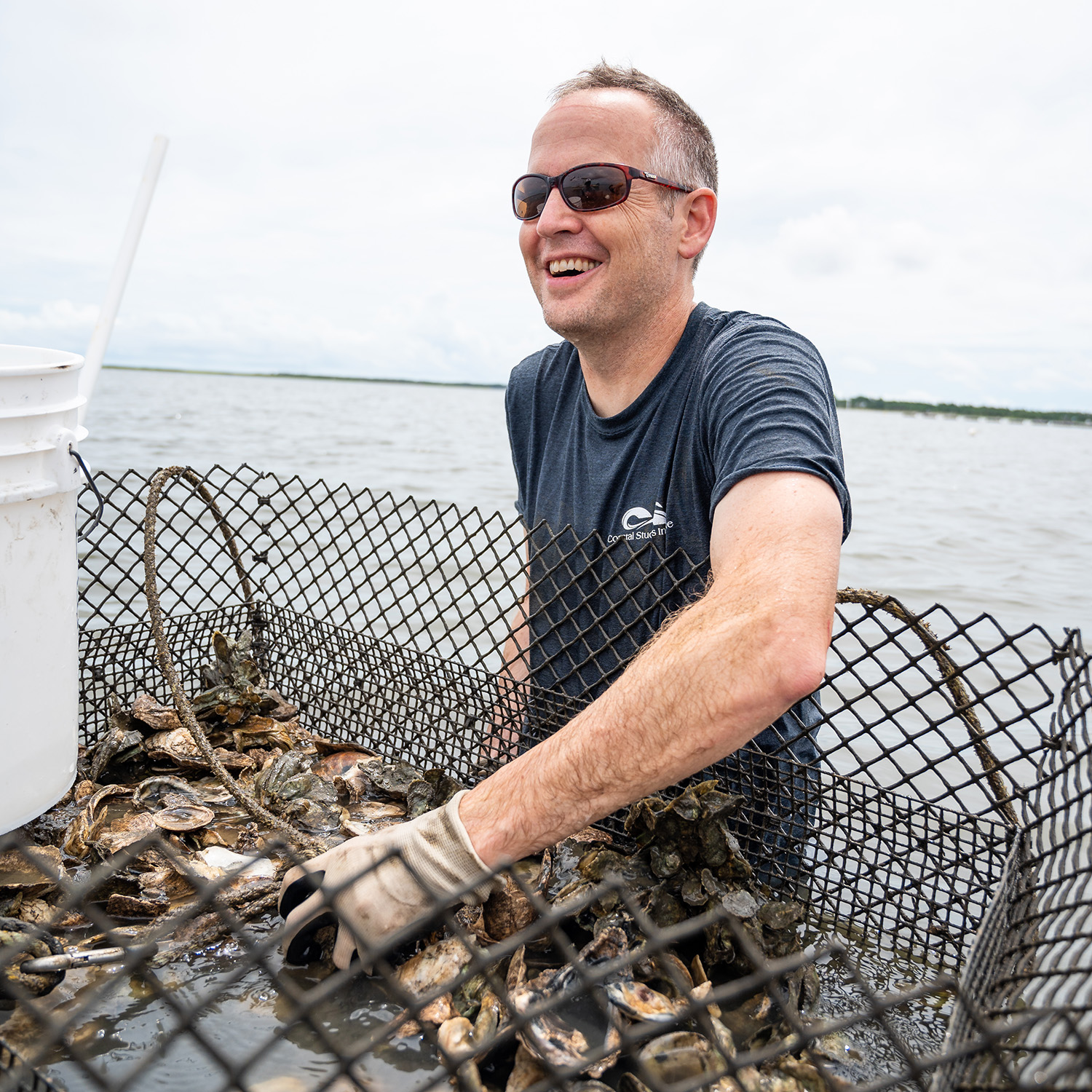
Jim Morley, Ph.D
Assistant Scientist, Coastal Studies Institute
Assistant Professor, Department of Biology, ECU
Office: Room No. 362
850 NC 345, Wanchese, NC 27981
Phone: 252-475-5454
Fax: 252-475-3545
Email: morleyj19@ecu.edu
Education
North Carolina State University, Ph.D., Zoology, 2013
North Carolina State University, M.S., Fisheries and Wildlife Sciences, 2004
SUNY Cortland, B.S., Biology, 2000
Research Interests
Jim is a fisheries ecologist and conducts a mix of modeling and field or laboratory-based research. Ecological modeling studies often use long-term survey data to examine trends in species distribution and abundance. Such models can be used to determine key environmental factors that impact species. In the field, the Morley-lab often combines traditional net and trap sampling approaches with modern technology, including sonar and acoustic tags.
The scope of Jim’s work ranges from local studies that are focused on North Carolina’s resources to studies that encompass the entire North American coast. A central theme is determining how climate variability and long-term change impact marine species and habitats. In addition to climate change, many other human-based stressors impact marine ecosystems and it is important to quantify these impacts so that policy makers have the right tools for decision making.
Academic Positions
2020 to Present: Assistant Professor, East Carolina University
2018 to 2019: Postdoctoral Researcher, University of North Carolina
2015 to 2018: Postdoctoral Researcher, Rutgers University
Publications
Flanagan PH, Jensen OP, Morley JW, Pinsky ML (2019) Response of marine communities to local temperature changes. Ecography 42:214-224
Morley JW, Selden RL, Latour RJ, Frolicher TL, Seagraves RJ, Pinsky ML (2018) Projecting shifts in thermal habitat for 686 species on the North American continental shelf. PLoS ONE, 13(5):1-28
Batt RD, Morley JW, Selden RL, Tingley MW, Pinsky ML (2017) Gradual changes in range size accompany long-term trends in species richness. Ecology Letters 20:1148-1157
Morley JW, Batt RD, Pinsky ML (2017) Marine assemblages respond rapidly to winter climate variability. Global Change Biology 23:2590-2601
Morley JW, Buckel JA (2014) Effects of temperature and prey size on predator-prey interactions between bluefish and bay anchovy. Journal of Experimental Marine Biology and Ecology 461:449-457
Morley JW, Buckel JA, Lankford TE (2013) Relative contribution of spring- and summer-spawned bluefish cohorts to the adult population: effects of size-selective winter mortality, overwinter growth, and sampling bias. Canadian Journal of Fisheries and Aquatic Sciences 70:233-244


 Based at the Coastal Studies Institute (CSI), the North Carolina Renewable Ocean Energy Program (NCROEP) advances inter-disciplinary marine energy solutions across UNC System partner colleges of engineering at NC State University, UNC Charlotte, and NC A&T University. Click on the links below for more information.
Based at the Coastal Studies Institute (CSI), the North Carolina Renewable Ocean Energy Program (NCROEP) advances inter-disciplinary marine energy solutions across UNC System partner colleges of engineering at NC State University, UNC Charlotte, and NC A&T University. Click on the links below for more information. ECU's Integrated Coastal Programs (ECU ICP) is a leader in coastal and marine research, education, and engagement. ECU ICP includes the Coastal Studies Institute, ECU's Department of Coastal Studies, and ECU Diving and Water Safety.
ECU's Integrated Coastal Programs (ECU ICP) is a leader in coastal and marine research, education, and engagement. ECU ICP includes the Coastal Studies Institute, ECU's Department of Coastal Studies, and ECU Diving and Water Safety. The ECU Outer Banks campus is home to the Coastal Studies Institute.
The ECU Outer Banks campus is home to the Coastal Studies Institute.

